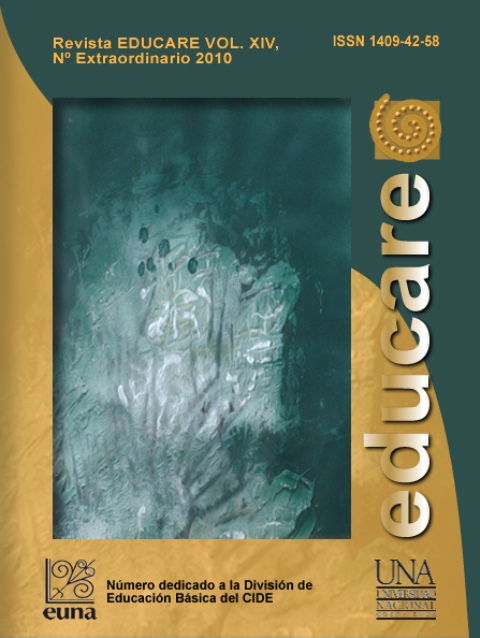Integral Perspective of the Costa Rican Educational Development
DOI:
https://doi.org/10.15359/ree.14-Ext.8Keywords:
educational development, education, educational amend, coverage, binding, repetition, desertion, innovationAbstract
The purpose of this essay is to raise the educational development that has been experienced in our country, outlining influential frames such as political, social, religious and economical ones. It aims to report statistical data as indicators of the development of our educational system, in areas of coverage, average education, repetition, desertion, among others. It is imperative to achieve changes and restructuring in our education system at all levels, from kindergarten to university, so it should take into account the contribution of all stakeholders in the education sector, as the human resource is valuable and all the innovative proposals should be heard, especially those that seek to build together and not ideas imposed that hinder the development of education in our country. Improvements must be necessary because there is an existing desire by many people of improving and achieving a true enrichment in our education.
References
Costa Rica, Ministerio de Educación Pública. (2009). Reforma integral de las normas reguladoras
de la promoción y repitencia dentro del sistema educativo público costarricense. Decreto
n° 34886-MEP. San José, Costa Rica: Despacho del Ministro de Educación, MEP.
Dengo, M. E. (1995). Educación costarricense. San José, Costa Rica: EUNED.
Gamboa, E. y Vásquez, G. (1998). Vamos a la secundaria. Estudios Sociales. México D. F.:
McGraw-Hill.
Molina, I. y Palmer, S. (2007). Historia de Costa Rica. Breve, actualizada y con ilustraciones. San
José, Costa Rica: Editorial Universidad de Costa Rica.
Programa Estado de la Nación en Desarrollo Humano Sostenible (Costa Rica). (2003). Décimo
Informe Estado de la Nación en Desarrollo Humano Sostenible. Programa Estado de la
Nación. San José, Costa Rica: El Programa.
Programa Estado de la Nación en Desarrollo Humano Sostenible (Costa Rica). (2007). Decimotercer
Informe Estado de la Nación en Desarrollo Humano Sostenible. Programa Estado de la
Nación. San José, Costa Rica: El Programa.
Programa Estado de la Nación en Desarrollo Humano Sostenible (Costa Rica). (2008). Decimocuarto
Informe Estado de la Nación en Desarrollo Humano Sostenible. Programa Estado de la
Nación. San José, Costa Rica: El Programa.
Programa Estado de la Nación en Desarrollo Humano Sostenible (Costa Rica). (2009). Decimoquinto
Informe Estado de la Nación en Desarrollo Humano Sostenible. Programa Estado de la
Nación. San José, Costa Rica: El Programa.
Salazar, J. (editor). (2003). Historia de la educación costarricense. San José, Costa Rica: EUNED.
Torre, S. (coordinador). (1998). Cómo innovar en los centros educativos. Estudio de casos. Madrid,
España: Editorial Escuela Española.
Downloads
Published
How to Cite
Issue
Section
License
1. In case the submitted paper is accepted for publication, the author(s) FREELY, COSTLESS, EXCLUSIVELY AND FOR AN INDEFINITE TERM transfer copyrights and patrimonial rights to Universidad Nacional (UNA, Costa Rica). For more details check the Originality Statement and Copyright Transfer Agreement
2. REUTILIZATION RIGHTS: UNA authorizes authors to use, for any purpose (among them selfarchiving or autoarchiving) and to publish in the Internet in any electronic site, the paper´'s final version, both approved and published (post print), as long as it is done with a non commercial purpose, does not generate derivates without previous consentment and recognizes both publisher's name and authorship.
3. The submission and possible publication of the paper in the Educare Electronic Journal is ruled by the Journal’s editorial policies, the institutional rules of Universidad Nacional and the laws of the Republic of Costa Rica. Additionally, any possible difference of opinion or future dispute shall be settled in accordance with the mechanisms of Alternative Dispute Resolution and the Costa Rican Jurisdiction.
4. In all cases, it is understood that the opinions issued are those of the authors and do not necessarily reflect the position and opinion of Educare, CIDE or Universidad Nacional, Costa Rica. It is also understood that, in the exercise of academic freedom, the authors have carried out a rogorous scientific-academic process of research, reflection and argumentation thar lays within the thematic scope of interest of the Journal.
5. The papers published by Educare Electronic Journal use a Creative Commons License:














 The articles published by Educare Electronic Journal can be shared with a Creative Commons License:
The articles published by Educare Electronic Journal can be shared with a Creative Commons License: 



